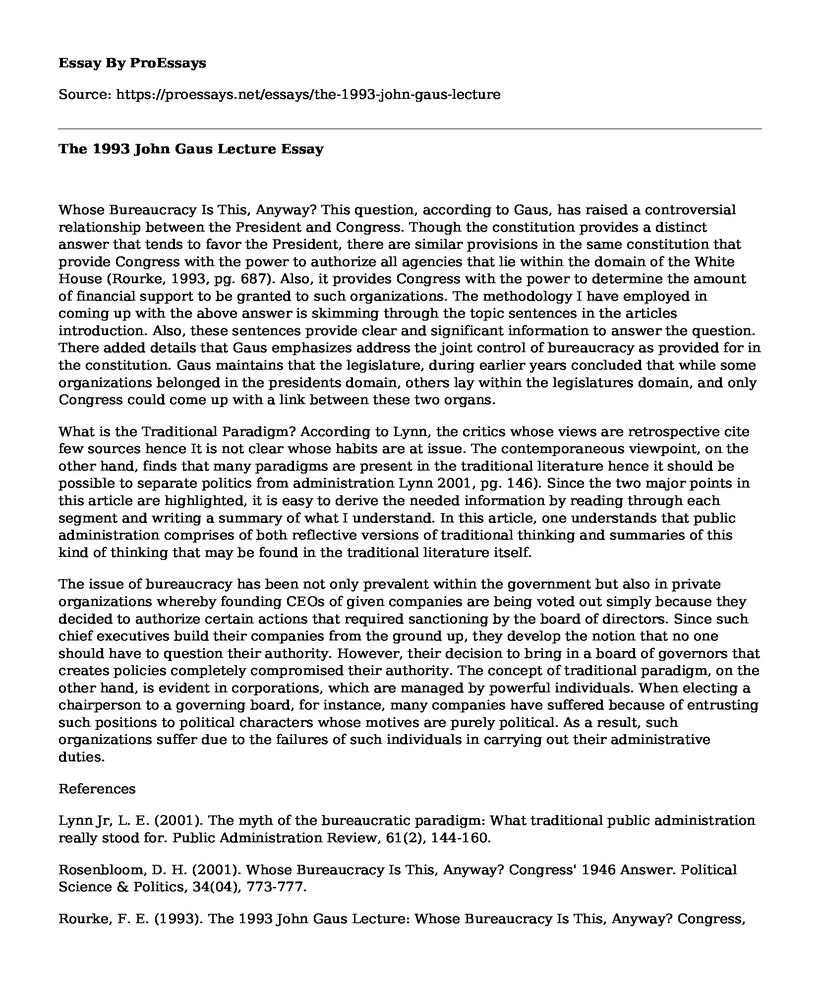Whose Bureaucracy Is This, Anyway? This question, according to Gaus, has raised a controversial relationship between the President and Congress. Though the constitution provides a distinct answer that tends to favor the President, there are similar provisions in the same constitution that provide Congress with the power to authorize all agencies that lie within the domain of the White House (Rourke, 1993, pg. 687). Also, it provides Congress with the power to determine the amount of financial support to be granted to such organizations. The methodology I have employed in coming up with the above answer is skimming through the topic sentences in the articles introduction. Also, these sentences provide clear and significant information to answer the question. There added details that Gaus emphasizes address the joint control of bureaucracy as provided for in the constitution. Gaus maintains that the legislature, during earlier years concluded that while some organizations belonged in the presidents domain, others lay within the legislatures domain, and only Congress could come up with a link between these two organs.
What is the Traditional Paradigm? According to Lynn, the critics whose views are retrospective cite few sources hence It is not clear whose habits are at issue. The contemporaneous viewpoint, on the other hand, finds that many paradigms are present in the traditional literature hence it should be possible to separate politics from administration Lynn 2001, pg. 146). Since the two major points in this article are highlighted, it is easy to derive the needed information by reading through each segment and writing a summary of what I understand. In this article, one understands that public administration comprises of both reflective versions of traditional thinking and summaries of this kind of thinking that may be found in the traditional literature itself.
The issue of bureaucracy has been not only prevalent within the government but also in private organizations whereby founding CEOs of given companies are being voted out simply because they decided to authorize certain actions that required sanctioning by the board of directors. Since such chief executives build their companies from the ground up, they develop the notion that no one should have to question their authority. However, their decision to bring in a board of governors that creates policies completely compromised their authority. The concept of traditional paradigm, on the other hand, is evident in corporations, which are managed by powerful individuals. When electing a chairperson to a governing board, for instance, many companies have suffered because of entrusting such positions to political characters whose motives are purely political. As a result, such organizations suffer due to the failures of such individuals in carrying out their administrative duties.
References
Lynn Jr, L. E. (2001). The myth of the bureaucratic paradigm: What traditional public administration really stood for. Public Administration Review, 61(2), 144-160.
Rosenbloom, D. H. (2001). Whose Bureaucracy Is This, Anyway? Congress' 1946 Answer. Political Science & Politics, 34(04), 773-777.
Rourke, F. E. (1993). The 1993 John Gaus Lecture: Whose Bureaucracy Is This, Anyway? Congress, the President and Public Administration. PS: Political Science & Politics, 26(04), 687-692.
Cite this page
The 1993 John Gaus Lecture. (2021, Mar 06). Retrieved from https://proessays.net/essays/the-1993-john-gaus-lecture
If you are the original author of this essay and no longer wish to have it published on the ProEssays website, please click below to request its removal:
- Digital Diplomacy Essay
- Paper Example on The United States Public Policy
- Paper Example on Drug Courts
- Republican Party Versus Pluralism Essay
- A Comparative Study of Education Paper Example
- Essay Example on Voting: The Cornerstone of Democracy - Exploring Its Importance
- Karl Marx Analytics - Essay Sample







